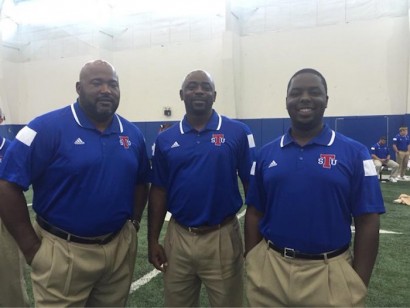For years, I have heard from NFL players like Dominique Rodgers-Cromartie and Anthony Levine about how awesome their college football coach was. Even those who have never played for this coach have spoken highly of him. When you go to meet someone that everyone respects, admires and loves, you immediately expect for them to have an impact on you. I had the pleasure of sitting down with Coach Rod Reed of Tennessee State University to discuss his take on what it takes to be a head coach, why HBCU football teams are not second tier, as well as what it was like returning home to his alma mater.
Coach Reed is hilarious. Yet underneath that humor and charm, you discover a coach who has a heart for the game and his players. His father, a former NFL player, taught Reed everything he knows from being a man to being a coach. Some of those lessons include reminding his son that there is no substitute for hard work, and there is no return without a deposit. So how did this former TSU football player take this advice upon taking over a struggling football program as head coach? He fought hard and took his team to the playoffs – a first for the HBCU in 30 years. The playoff game gave not only his players exposure on ESPN, but it created what Coach Reed likens to guerilla marketing. Their playoff appearance had everyone talking about TSU. It also had people realizing that the HBCU was a playoff-producing football team.
Early on, Coach Reed realized that it would take more than just wins to promise his players success. He has a strict policy when it comes to academics. Last year, more than 30 of his players had a 3.0 GPA. Getting a degree isn’t something Coach Reed takes lightly. “When my players are sitting at home years from now, I don’t want them to say that I used them for football. I make sure they have a degree as well.” Outside of academics, he also recognizes that his role in the lives of his players extends far beyond just being a coach. “Some of these kids are bipolar, have ADHD, come from backgrounds that aren’t that great. As a coach, I have to be their psychiatrist and the male figure in their life. I have to be able to play all of those roles.” As we have seen in recent months, more and more college players are coming forward with mental health issues. The NCAA created a guide for schools to go by in order to help address this issue. Before this guide was created, Coach Reed provided support to his players addressing these issues. He’s even hired staff members who are invested in the program to serve as an extra support system for the players. His team of coaches carry the same responsibility as him, providing players with more than just a college football experience. Almost all of his entire staff attended TSU, many of whom were coached by him.

When asked how he feels when people say HBCU football programs can’t match up with PWI programs with larger football programs, he said, “I recruit players that those schools go after. I may not get them, but I still go after them. I don’t bother listening to the critics who question the ability of my team based on our status as an HBCU. We play in an FCS division that is a major division. Our record in that division lines up against those other schools. We are just as good if not better. There are only 6 schools in the FCS that have an indoor practice facility. We are one. There is only one HBCU that has an indoor practice facility, that’s us.”

Before I let Coach Reed go, I had to ask him who was his favorite player to coach, and he said it would be Dominique Rodgers-Cromartie. “As a player he challenged you and he was a good kid who was worth the investment that people questioned,” said Reed. In addition to Rogers-Cromartie, Reed has had at least two other players play in the Super Bowl.
I’m not sure Coach Reed knows just how much he has impacted not only the lives of his players and other around me, but also how he has changed the narrative surrounding HBCU football teams. When asked how he would like to close out the interview, he ended with the same sentence he always ends with “Go Big Blue.”
Stay connected to all things Black Twitter, news and the best content on the internet by signing up for Blavity’s newsletter.
